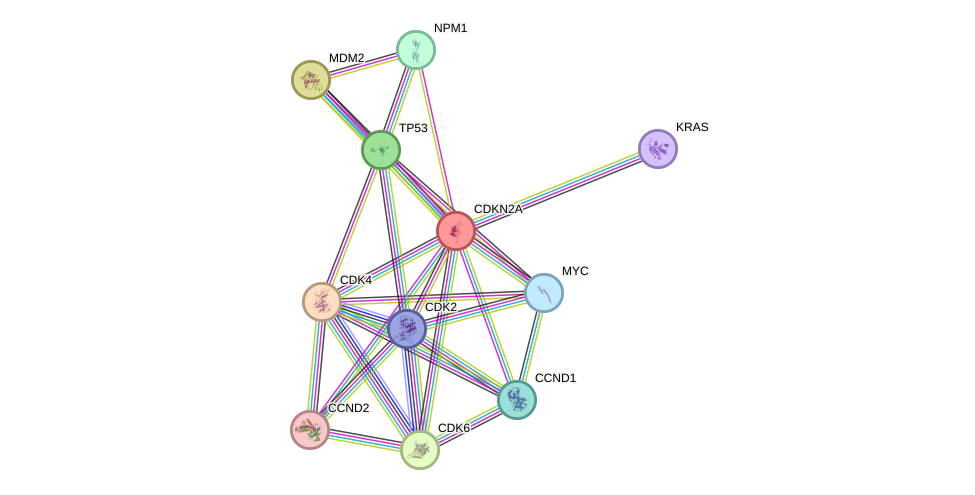GenAge entry for CDKN2A (Homo sapiens)
Entry selected based on evidence directly linking the gene product to ageing in a mammalian model organism
Gene name (HAGRID: 226)
- HGNC symbol
- CDKN2A
- Aliases
- CDK4I; p16; INK4a; MTS1; CMM2; ARF; p19; p14; INK4; p16INK4a; p19Arf; p14ARF; CDKN2; MLM
- Common name
- cyclin-dependent kinase inhibitor 2A
Potential relevance to the human ageing process
- Main reason for selection
- Entry selected based on evidence directly linking the gene product to ageing in a mammalian model organism
- Description
The CDKN2A gene encodes different transcripts involved mostly in cell cycle regulation and cellular senescence, including the tumour suppressor proteins p16 and p19 [1494]. At least three alternatively spliced variants encoding distinct proteins have been reported.
CDKN2A expression levels increase with age in rodents [1394]. In one study, increased CDKN2A dosage in mice resulted in cancer resistance and normal ageing [1401]. Conditional expression of transgenic p16 in mice strongly inhibits proliferation of normal and stem- intestinal cells, cell cycle progression, and causes several signs of premature ageing (reduced hair density and diameter, variable lightening of hair colour, lower weight, and kyphosis, etc.). These features of premature ageing are reversible through de-induction of p16 [3615]. p16 induced senescence in mouse pancreatic beta cells enhances INS secretion [4353]. One study in progeroid mice reported that the clearance of senescent cells expressing CDKN2A delays ageing-associated phenotypes, such as lordokyphosis, sarcopenia and cataracts, although it does not extend lifespan [1979]. In normal mice, the clearance of p16 positive cells delays tumorigenesis, increases lifespan and attenuates age-related deterioration of several organs without apparent side effects [4352]. In contrast, increased but regulated CDKN2A and TP53 activity has been found to ameliorate age-associated central nervous system functional decline in mice, acting to maintain the neural stem cell pool [4333]. Regulated CDKN2A activity provides a mechanism for extended lifespan and health span in mice [4333].
Loss of CDKN2A in mice has been reported to result in tumour susceptibility [1395]. Mice deficient in CDKN2A also showed a smaller age-related decline in self-renewal potential as this process is associated with increasing levels of CDKN2A [1945]. In geriatric mice, satellite cells lose reversible quiescence by switching to an irreversible pre-senescence state, due to derepression of CDKN2A. Silencing of CDKN2A restores the cell quiescence [3614].
Mutations in the human CDKN2A gene have been associated with cancer [1399]. Therefore, although it is clear CDKN2A is involved in cancer and is a marker of ageing, its mechanistic role in human ageing remains unknown.
Cytogenetic information
- Cytogenetic band
- 9p21
- Location
- 21,967,752 bp to 21,975,133 bp
- Orientation
- Minus strand
Protein information
- Gene Ontology
-
Process: GO:0000082; G1/S transition of mitotic cell cycle
GO:0001953; negative regulation of cell-matrix adhesion
GO:0007050; cell cycle arrest
GO:0007265; Ras protein signal transduction
GO:0008285; negative regulation of cell proliferation
GO:0030308; negative regulation of cell growth
GO:0032088; negative regulation of NF-kappaB transcription factor activity
GO:0034393; positive regulation of smooth muscle cell apoptotic process
GO:0035986; senescence-associated heterochromatin focus assembly
GO:0042326; negative regulation of phosphorylation
GO:0045736; negative regulation of cyclin-dependent protein serine/threonine kinase activity
And 6 more GO terms Cellular component: GO:0005634; nucleus
GO:0005737; cytoplasm
GO:0005829; cytosol
GO:0035985; senescence-associated heterochromatin focus
Show all GO termsFunction: GO:0004861; cyclin-dependent protein serine/threonine kinase inhibitor activity
GO:0005515; protein binding
GO:0019901; protein kinase binding
GO:0044822; poly(A) RNA binding
GO:0051059; NF-kappaB binding
Protein interactions and network
- Protein-protein interacting partners in GenAge
- TP53, WRN, E2F1, MYC, BRCA1, HIF1A, HSP90AA1, EGR1, TOP1, UBE2I, PML, PRKCA, EEF2, PCNA, UCHL1, RELA, HDAC1, HSPA9, MAPK8, SP1, HSPA8, MDM2, ATR, TP63, IKBKB
- STRING interaction network
Retrieve sequences for CDKN2A
Homologs in model organisms
- Danio rerio
- cdkn2a/b
In other databases
- LongevityMap
- This gene is present as CDKN2A
- CellAge
- This gene is present as CDKN2A
- CellAge gene expression
- This gene is present as CDKN2A
Selected references
External links
- EPD
- ORF Accession
- NM_000077
- CDS Accession
- NP_000068
- OMIM
- 600160
- HPRD
- 02542
- Ensembl
- CDKN2A
- UniProt/Swiss-Prot
- CDN2A_HUMAN
- GeneCards
- CDKN2A
- Entrez Gene
- 1029
- GenAtlas
- CDKN2A
- Internet
- Search Google


